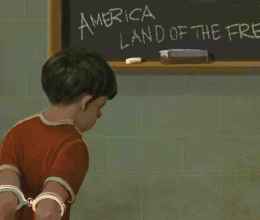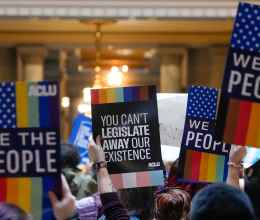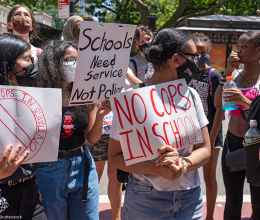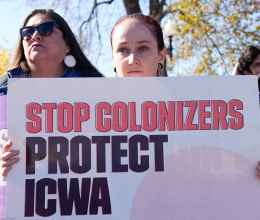
TALLAHASSEE, Fla. – The No Place for a Child coalition, a diverse alliance of organizations that help children, today announced its support for proposed legislation that would limit children being prosecuted as adults in Florida.
The bills, SB 936 and HB 509, would ban the indictment of a child younger than 14 as an adult, allow a child in the adult justice system to request a transfer to juvenile court, and require judges to justify why an adult sanction on a child is necessary, among other reforms.
“The unchecked and unaccountable ability to charge children as young as 13 as adults in Florida is a policy desperately in need of reform,” said Sal Nuzzo, vice president of policy at The James Madison Institute. “Sending a child into the adult criminal justice system should be among the most heavily debated actions taken in our society. While we support the need for prosecutors to have at their discretion all the tools necessary to prevent crime and hold those who commit crimes accountable for their actions, direct file is an aberration of justice. Public safety in both the short and long term will be improved when we restore the objective wisdom of judges in the process and bring the system back to its original structure.”
Florida prosecutes more children in the adult criminal justice system than any other state. Since 2009, more than 14,000 children – some as young as 10 years old – have been prosecuted as adults in Florida. Children in the adult system are more likely to reoffend, and less likely to get back on track than children in the juvenile justice system. Prosecuting children as adults creates more crime, not less.
The nonpartisan No Place for a Child coalition announced its support for the juvenile justice bills today at a news conference outside the state Senate chambers at the Capitol. Speakers included state Sen. Bobby Powell, D-West Palm Beach, who is the sponsor for SB 936; Miguel Rodriguez, who was tried as an adult at 15 in Pasco County; Scott McCoy, senior policy counsel for the Southern Poverty Law Center (SPLC); and Dawn Steward of the Florida PTA.
“It’s past time for elected officials in Florida to end the abysmal practice of locking up children as adults, an injustice that goes against their constituents’ wishes,” said McCoy, of the SPLC. “Yet year after year, Florida legislators have failed to pass meaningful reforms to address this serious problem. We support SB 936 and HB 509, which provide a great start on reducing the number of children who are tried as adults in Florida. But our work will not be done until no child is sent to the adult system. The adult criminal justice system is no place for a child.”
In 2015-16, more than 1,200 children were prosecuted as adults in Florida. Most of them were charged with nonviolent offenses and were not a threat to public safety. Almost all of them – 98 percent – were prosecuted as adults solely at the discretion of prosecutors, without a judge’s input, through a practice commonly referred to as “direct file.” Under current law, prosecutors can direct file children as young as 14. There is, however, no minimum age for indictment as an adult, and children as young as 10 have been prosecuted as adults in Florida. If passed, SB 936 – sponsored by Powell – and HB 509 – sponsored by state Rep. Sean Shaw, D-Tampa, would:
- Eliminate the ability to indict a child younger than 14 as an adult
- Prohibit prosecuting a child – whom a judge has determined is incompetent – as an adult
- Prohibit direct file of 14- and 15-year-olds, and instead hold them accountable in the juvenile justice system
- Limit adult prosecution of 16- and 17-year-olds to only the most serious crimes, like murder or manslaughter
- Create a fitness hearing before a judge, in which a child who has been transferred to the adult criminal justice system can request a return to juvenile court
- Require judges to justify why adult sanctions are necessary when they impose an adult sentence on a child
“HB 509 and SB 936 are critical justice reform measures,” said Jeree Thomas, policy director at the Campaign for Youth Justice. “Nationally, Florida is an outlier in its prosecution of children as adults. Florida is one of 12 states and D.C. that allows prosecutors to decide whether to try a youth as an adult. Among those states, only Florida, Louisiana, Michigan and D.C. have no reverse waiver statute that would allow a youth to challenge a prosecutor’s decision to transfer their case to adult court.”
A recent poll released by Right on Crime, a conservative advocacy group, showed support among voters for these reforms. Seventy-four percent of Floridians say youth charged with crimes should stay in the juvenile justice system, according to the survey.
“I am convinced it is better to keep as many children as possible in the juvenile justice system rather than sending more and more juveniles to adult prisons where punishment is the goal over rehabilitation,” said Julianne Holt, public defender for Florida’s 13th Judicial Circuit. “We should bring judges back into their traditional role to help decide when it is necessary to send juveniles to adult court.”
Seventy percent of Floridians say judges – not prosecutors – should decide whether to prosecute a child as an adult, according to the recent survey. Eighty-one percent of Floridians say prosecutors should disclose threats to prosecute children as adults, a practice that could pressure youth to take plea deals as a way to remain in the juvenile justice system with juvenile sanctions.
“This is not an issue of prosecutorial discretion,” said Kara Gross, legislative counsel for the ACLU of Florida. “It is a question of unchecked power. No individual, no matter how good and just, should be empowered to unilaterally send a youth to an adult jail. Judges should not be powerless to intervene or to review these decisions. Adult jails and prisons are simply not equipped to meet the developmental needs or educational rights of teenagers. This legislation will ensure that courts have an opportunity to review these decisions and send youth in need of rehabilitation back to a system specifically designed to rehabilitate them.”
Adult jails are not designed for children. When children are prosecuted as adults, they are required to be held in adult jails, but must be separated from adults. To meet this requirement, jails often hold children in solitary confinement, despite widespread condemnation of the technique. In fact, children housed in adult facilities are 36 times more likely to commit suicide than those in juvenile facilities.
Children in adult jails are also at a higher risk for sexual abuse, and don’t receive adequate educational services. Eighty-six percent of Floridians in the Right on Crime poll say that children should not be held in adult jail while awaiting trial.
Moreover, children convicted in the adult system are branded with a felony conviction for life, diminishing opportunities for education and future employment, and stripping them of the right to vote before they even reach the legal voting age of 18.
See below for other responses from No Place for a Child partners about the proposed legislation:
Bob Dillinger, president of the Florida Public Defender Association, said: “These bills restore due process of law to Florida’s process for sending children into adult courts and prisons without taking away the ability to punish violent juvenile offenders. It represents significant reform and should be supported by everyone who cares about treating our most troubled children with transparency and fairness.”
Cindy Gerhardt, president of the Florida PTA, said: “There are many contributing factors which result in a child finding themselves in the juvenile justice system. Whether it’s an unstable home environment, or the result of outside influences, Florida PTA believes that we must stop the criminalization of children that will have a negative lifetime effect, taking away their opportunity to reach their full potential. We should continue to invest in prevention and early intervention. Florida PTA believes that children should be given fair and appropriate treatment that can keep them from the doors of the juvenile justice system in the first place. We must not continue to indoctrinate our children into the culture which accepts the school-to-prison pipeline.”
Margarita Romo, executive director at Farmworkers Self-Help, Inc., said: “Living in a community where there are few opportunities for our youth to receive the benefit of good support systems, too often bad choices are made that send our babies away to prison. The whole system needs to be revamped, and folks working in governmental offices need to be accountable to the work they do.”
###
No Place for a Child is a diverse, nonpartisan coalition of organizations committed to bringing change to Florida that has proven to be more effective for youth and the public. The coalition includes the Southern Poverty Law Center, ACLU of Florida, Project on Accountable Justice, The James Madison Institute, Florida PTA, R Street, Campaign for Youth Justice, Families of Youth Incarcerated, Florida’s Children First, Florida Council of Churches, Florida Juvenile Justice Association, Florida Legal Services, Escambia Youth Justice Coalition, Jacksonville Juvenile Justice Coalition, National Congress of Black Women, National Coalition of Jewish Women, PACE Center for Girls, Florida Immigrant Coalition, Farmworker Self-Help, New Florida Majority, and the Public Interest Law Section of The Florida Bar.





